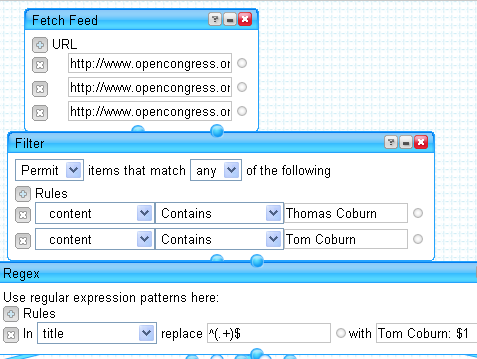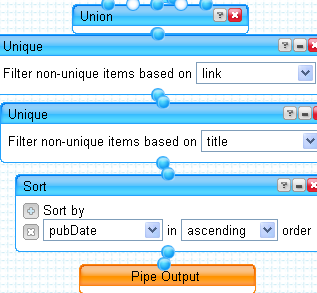March 2007 Archives
 Do you know what your Representative is doing? How about your Senators? I typically don’t, unless they do something embarrassing or are running for re-election. So how can you, concerned citizen, keep up with what your congresscritters are doing?
Do you know what your Representative is doing? How about your Senators? I typically don’t, unless they do something embarrassing or are running for re-election. So how can you, concerned citizen, keep up with what your congresscritters are doing?
I’m glad you let me ask on your behalf!
OpenCongress, which I’ve mentioned before, provides three feeds for each Congress person: voting, news, and blogs. You could simply subscribe to all those individual feeds, but that would get you back to work too quickly. Instead, we’re going to build a Yahoo Pipe that combines these feeds and mangles them in useful ways.
If you’ve never used Yahoo Pipes before you should sign up and play with it a little first, otherwise you will have no idea what I’m talking about here. I also recommend looking at the Pipe I built to understand what’s going on. You could even clone it to make creating your own easier. But, again, think about why we’re doing this to begin with: to avoid real work.
You need to start by looking up your representatives on OpenCongress. If you don’t know who they are, visit here and here to find out, then search for them on OpenCongress.
 Looking at the page for each congress person, you’ll see three orange “Feed” buttons. Copy the locations of those feeds — we’ll need them in a minute.
Looking at the page for each congress person, you’ll see three orange “Feed” buttons. Copy the locations of those feeds — we’ll need them in a minute.
 Now, create a new Yahoo Pipe and add the following: 3 Fetch Feed modules, 3 Filter modules, 3 Regex modules, 1 Union module, 2 Unique modules, and a Sort module. In one of the Fetch modules add the three feeds for a particular Congress person. Connect that module to a Filter module. The Filter should be set to “Permit items that match any of the following.” Then add rules like this:
Now, create a new Yahoo Pipe and add the following: 3 Fetch Feed modules, 3 Filter modules, 3 Regex modules, 1 Union module, 2 Unique modules, and a Sort module. In one of the Fetch modules add the three feeds for a particular Congress person. Connect that module to a Filter module. The Filter should be set to “Permit items that match any of the following.” Then add rules like this:
content Contains Thomas Coburn
content Contains Tom Coburn
Why are we doing this? Well, the OpenCongress news and blog feeds are doing “AND” searches on names — basically, looking for any article that has both Thomas and Coburn in it. This is not so much a problem with a name like Coburn, but with Representative Frank Lucas I kept getting news about Frank Smith and Lucas Tyler and all the fish they caught on their last excursion.
In my example above, the second line is probably wasted, but I throw it in anyway just to be complete. If you do something like that, be very sure you set the Filter to match “any”. I forgot to do this on one of mine and couldn’t figure out why I wasn’t getting any items about Senator Inhofe.
Now, link the Filter to a Regex. Your Regex rule should be like this:
In title replace ^(.+)$ with Tom Coburn: $1
We do this so that it’s easy to glance at headlines and know which representative the item is about.
 Now, repeat what we just did for each of your other two Congress people. Then connect each Regex module to the Union module. Connect the Union to one of the Uniques and set it to filter based on link. This will remove any article that shows up twice, perhaps because it had two or more of your representatives mentioned. Connect this Unique module to another Unique module and set the second one to filter on title. This will remove some (but not all) instances where an AP article shows up on multiple sites. Attach the second Unique to the Sort module and sort on pubDate. Finally, connect the Sort to the Pipe Output and you’re done.
Now, repeat what we just did for each of your other two Congress people. Then connect each Regex module to the Union module. Connect the Union to one of the Uniques and set it to filter based on link. This will remove any article that shows up twice, perhaps because it had two or more of your representatives mentioned. Connect this Unique module to another Unique module and set the second one to filter on title. This will remove some (but not all) instances where an AP article shows up on multiple sites. Attach the second Unique to the Sort module and sort on pubDate. Finally, connect the Sort to the Pipe Output and you’re done.
And see? Now’s it’s almost time to start your weekend. Want the procrastination to last a little longer? Blog about it!
I wish I could create a Pipe that would allow people to input something (name, ID, etc.) and get a feed just for them. OpenCongress assigns unique IDs to each Congress person, but their feeds contain both the ID and the name, and all the string manipulation required to deal with names would be problematic.
If you do create your own Elected Representatives Pipe, I encourage you to Publish it and either leave a comment here or blog about it on your own site. That way, other people in your district can find it and make use of it. Who knows? If people start paying attention to what Congress is doing, all kinds of interesting things could happen.
While some people seem to have been disappointed by this year’s panels at SXSWi (see those opinions here, there, and a followup here), I felt most of the panels/lectures I attended were excellent. Of course, with this much content, not all of the sessions are going to be winners, but from what I attended I thought only two of them were poorly done.
A few general notes about the conference:
Whenever I attended a session on the third floor I felt like I was being punished for something. That area was difficult to get to, the rooms were too small, and the wifi was terrible. If there’s not enough space for all the sessions in the main conference area, then it’s probably time to start holding Film and Interactive separately.
Panelists need to learn how to keep a tighter rein on audience questions. Many were self-serving and/or way too long.
I’m only so-so on the 25-minute “power” sessions. Of the ones I attended, most would have been better stretched out to an hour. They pretty much eliminate the possibility of questions, which (aside from the problem I mentioned before) are one of the best parts of SXSWi.
What follows is a list of the panels I attended, and some brief thoughts on each. I’ve linked to podcasts and other supporting material, where available. More of the rest should be available as podcasts at SXSW soon.
Continue reading “SXSW 2007: The Panels”…
As I started thinking about an election Pipe, I had this grand vision of an uber-feed that would pull together news, blog, and Congressional voting (when applicable) information on all candidates into a political information overload.
That didn’t so much pan out. Apparently, there is a limit to the number of feeds — or possibly feed items — that Yahoo Pipes can handle. Somewhere around 12, 13 feeds the Pipe got clogged and wouldn’t return any results. And since that was less than half of the list of feeds I had, I decided to scale things way back.
So I created the 2008 Presidential Candidates, Congressional Votes Pipe. As far as Pipes go, it’s as simple as it gets — it just pulls the voting record feed from OpenCongress.org for each Congressperson that is running for President. It seemed useful to see how the candidates are voting (or if they’re voting) in the months before the election. And if you want blogs and news there are plenty of Pipes that provide that.
I’ll do my best to keep it updated as people drop in and out of the race.
Going to a conference like SXSW is always a tricky decision for a small business like us. It’s a lot of expenses and a lot of downtime for a small shop, particularly one that just went fully full-time.
But we did decide to go, and it was totally worth it. Matt has a good recap that describes the experience well. I will add that there was a definite feeling of renewed energy there — amazing things are happening in our industry right now, good things, and everyone is excited to be a part of it. It seemed like everyone there was working on something, and you couldn’t help but look around and wonder which of the people sitting next to you was working in the thing that everyone will be all a-Twitter about at next year’s SXSW.
I’ll have more details about the conference this week, but I wanted to get down my overall impression first. Suffice it to say, we came home exhausted, inspired, and even further behind. :-) I’m already looking forward to next year.
I don’t know about you, but I have far more artists in my music library than I can keep track of. Every once in a while I’ll be listening to a song and think, “I wonder if they have anything new out.” Then I look and find I’m two or three albums behind. When I heard about Last.fm and their data feeds I thought there should be a way to use that. Then when Yahoo Pipes came out, I knew there was. So over the last couple of days I spent my free time throwing together my New Releases Pipe.
New Releases takes the artists from your Last.fm recent tracks feed and searches for them in iTunes New Releases feed. The hardest part was wrapping my head around the “For Each” operators in Yahoo Pipes. What I wanted to do was filter one feed using text from another feed. “For Each” is how you do that. You have to create another pipe (in this case, Find New Releases) that does a search of the feed based on a text input. When you drop that Pipe into the “For Each” module, you can link that text input to a data field coming from the other feed.
Now, some caveats:
Searching based on an exact text match always, always, makes me nervous. This really depends on Last.fm and iTunes using the exact same name for the artist — spaces, punctuation, everything. Because of that, expect this to miss some things.
This is really hit or miss, anyway, because it’s matching your last 10 tracks from last.fm to iTunes 100 new releases. To improve your odds of finding albums, set your feed reader to update fairly often (probably an hour, although every 30 minutes would be ideal) and listen to music constantly.
To get the artist name from the Last.fm feed with the least amount of trouble I’m running regular expressions against the artist URL in the description field. This requires, among other things, replacing all the plus signs with spaces. Yahoo Pipes doesn’t have a “replace all” function yet, so I’m just replacing one plus sign several times to try to catch them all. Because of this, you might miss releases from “…And You Will Know Us By The Trail Of The Dead.” You’re welcome.
Anyway, try it out, and if you have recommendations for improvements post them in the comments. I have some ideas of my own, and I will be posting them when they’re done.
Have you ever been at a party where everyone was talking about a particular subject, but you couldn’t think of anything meaningful to contribute? Then, after three days of stewing about it, you finally think of something to say, but by then the party is over and no one you talk to remembers the original conversation ever took place? Yeah, that’s what this is.
I’m referring to the conversation Kottke started regarding gender diversity at tech conferences. I’m not going to link to all the relevant posts — you can find them if you’re really interested. I just want to point out something: Some conference organizers argued that they book the speakers people want to see, regardless of gender, race, etc. Here’s the thing: SXSW, which had one of the highest percentages of female speakers among the conferences Kottke researched, hosted panels that were voted on by the public. So it certainly seems that, when asked, the tech community wants more variety. Of course, there’s probably twenty different ways to look at this, but I would hope conference organizers would see this as evidence that you can fill seats without booking the same speakers for every conference.
It’s something of a tradition when I come to SXSW: Rather than listen to the panels I’ve paid good money to see, I overhaul my blog. In this case, it was long overdue. I was still running WP 1.5, while the rest of the world had moved past that version long ago. So I decided to just do it, and I figured while I was at it I would shed my old design and work on a new one. This is the Sandbox theme, a nice utilitarian design for folks who like to start with an empty canvas.
I’ve got some design ideas percolating, and a ton of new tech stuff I want to play with. This blog was originally supposed to be a place for me to experiment with design, development, and writing. Lately, none of that has happened here. But, inspiration and renewed energy are also SXSW traditions, so maybe some of that will show up here.
Speaking of SXSW: Twitter is the new black. I can’t say I understand the appeal just yet, but I’m having fun playing with it. There are screens around the convention center showing what people are Twittering.
So far, we’re having a great time here. Bad timing has kept us from doing some of the things we wanted to do, but that happens. I’m taking notes, so I’ll have more to write about it when I get back.
 Do you know what your Representative is doing? How about your Senators? I typically don’t, unless they do something embarrassing or are running for re-election. So how can you, concerned citizen, keep up with what your congresscritters are doing?
Do you know what your Representative is doing? How about your Senators? I typically don’t, unless they do something embarrassing or are running for re-election. So how can you, concerned citizen, keep up with what your congresscritters are doing? Looking at the page for each congress person, you’ll see three orange “Feed” buttons. Copy the locations of those feeds — we’ll need them in a minute.
Looking at the page for each congress person, you’ll see three orange “Feed” buttons. Copy the locations of those feeds — we’ll need them in a minute. Now, create a new Yahoo Pipe and add the following: 3 Fetch Feed modules, 3 Filter modules, 3 Regex modules, 1 Union module, 2 Unique modules, and a Sort module. In one of the Fetch modules add the three feeds for a particular Congress person. Connect that module to a Filter module. The Filter should be set to “Permit items that match any of the following.” Then add rules like this:
Now, create a new Yahoo Pipe and add the following: 3 Fetch Feed modules, 3 Filter modules, 3 Regex modules, 1 Union module, 2 Unique modules, and a Sort module. In one of the Fetch modules add the three feeds for a particular Congress person. Connect that module to a Filter module. The Filter should be set to “Permit items that match any of the following.” Then add rules like this: Now, repeat what we just did for each of your other two Congress people. Then connect each Regex module to the Union module. Connect the Union to one of the Uniques and set it to filter based on link. This will remove any article that shows up twice, perhaps because it had two or more of your representatives mentioned. Connect this Unique module to another Unique module and set the second one to filter on title. This will remove some (but not all) instances where an AP article shows up on multiple sites. Attach the second Unique to the Sort module and sort on pubDate. Finally, connect the Sort to the Pipe Output and you’re done.
Now, repeat what we just did for each of your other two Congress people. Then connect each Regex module to the Union module. Connect the Union to one of the Uniques and set it to filter based on link. This will remove any article that shows up twice, perhaps because it had two or more of your representatives mentioned. Connect this Unique module to another Unique module and set the second one to filter on title. This will remove some (but not all) instances where an AP article shows up on multiple sites. Attach the second Unique to the Sort module and sort on pubDate. Finally, connect the Sort to the Pipe Output and you’re done.

